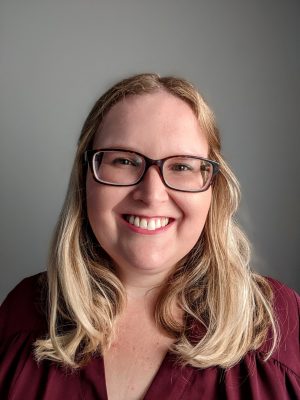Alumna Turns Translations Studies Education into Project Management Career
By: Development Communications | January 12, 2021
After receiving her bachelor’s degree in humanities from Bucknell University, Stacey Knepp MA’09 knew she wasn’t done with the work she had started as an undergraduate.
“I had taken numerous years of ancient Greek, translating Greek text,” Knepp said. “UTD was one of a few universities in the country offering a graduate-level program in translation studies. It was a good fit for me.”
A Pennsylvania native, Knepp drove for two days straight before she arrived at UT Dallas in the heat of the summer in 2007, on her own for the first time and ready to dive headfirst into her coursework.

“It was my first big significant time away from my family,” Knepp said. “I didn’t know a soul. It was definitely intimidating.”
However intimidating it was, Knepp settled into the Center for Translation Studies with ease, even receiving a Critical Language Scholarship from the U.S. State Department to study Arabic in Amman, Jordan.
“One of the strengths of the humanities program, you’re expected to take things outside of your subject area and explore topics that are outside of your comfort zone,” Knepp said.
One of the more pivotal moments in Knepp’s time at UT Dallas occurred when the program hosted the American Translation Literary Association conference. Not only did she see the work that went into it behind the scenes, but she also made valuable connections.
“I got a lot of hands-on experience there and got exposure to the field,” Knepp said. “It was a good way for me to get to know the students in my program whose relationships were key to my education.”
After Knepp graduated in 2009, she took a project manager position with Experis Global Content Solutions in Arlington, Virginia, where she specialized in translating websites and software. Four years later, she accepted a position as a project manager for the United States Holocaust Memorial Museum in Washington, D.C., where she currently she develops strategic plans and manages educational projects anchored in the museum’s thematic initiatives and special exhibitions
“You really have to wear different hats to be successful in working in a creative field like this,” Knepp said. “I value having different perspectives and exploring different fields as part of my education.”
In the past few years, Knepp has centered her time on the museum’s Americans and the Holocaust exhibit, in which she managed teams, curators and technology experts to bring to initiative’s vision to life. Like most businesses in 2020, Knepp and her team had to pivot when the tour for the traveling exhibit project she was working on could no longer be executed the way it was intended.
“Unfortunately, the traveling exhibition had to be put on hold on the eve of its national tour to 50 libraries, which had been years in the making,” Knepp said. “We quickly created virtual programming resources and professional development opportunities to support the librarians and their communities.”
Working on projects through the museum’s Levine Institute for Holocaust Education’s Education Initiatives Division, Knepp and her team help the division in its efforts to provide quality education on the Holocaust to secondary schools and higher education. Those efforts have adapted as well, turning into virtual experiences versus the traditional, tangible displays.
“We’re learning and adapting as we’re going and trying to make things better,” Knepp said. “In this remote learning environment, we’re trying to replace our exhibits as a learning tool and thinking about how we tell stories through our objects that we can do online versus in our spaces.”
Thanks in part to her education at UT Dallas, Knepp was able to take the tools the Center for Translation Studies equipped her into a successful project management career.
“I really value an interdisciplinary education because the work that we do isn’t isolated to just one type of way of thinking,” Knepp said. “If someone had come into what I’m doing with a standard business outlook on project management, they wouldn’t necessarily be happy or successful with this type of work.”
You can hear more about Knepp’s experience and work in the virtual Comet Corner Series “Designing Educational Experiences in Museums with Audience Research” on Jan. 27 at noon CST.